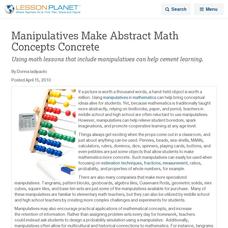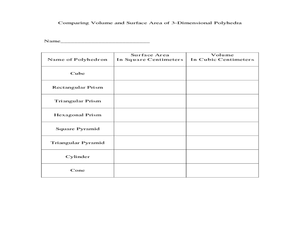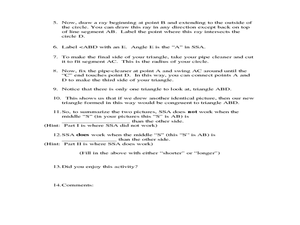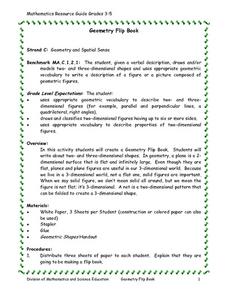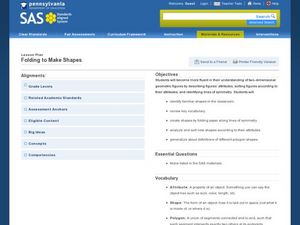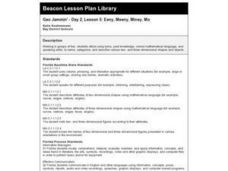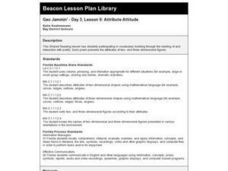Curated OER
Manipulatives Make Abstract Math Concepts Concrete
Using math lessons that include manipulatives can help cement learning.
Curated OER
The Value of Volume
Students measure the perimeter and area of their polygons. In this geometry lesson, students calculate the volume and area using the correct tools. They calculate the time and temperature and the perimeter and side lengths of triangles.
Curated OER
Analyzing 3-D Shapes and 2-D Representations
Students can analyze 3-D objects better with actual physical models and by also drawing 2-D representations of them.
Curated OER
A World of Symmetry
Students identify lines of symmetry. In this symmetry lesson, students create objects and identify their lines of symmetry. They answer questions about lines of symmetry. Students cut shapes out of cookie dough and...
Illustrative Mathematics
Box of Clay
What happens to a volume when you scale the dimensions of a rectangular prism? In this problem, a box of clay is increased in each dimension, with the intent to see if learners can generalize the result. The addition of...
Curated OER
Polyominoes
In this dominoes worksheet, learners solve a word problem involving different ways to put dominoes together. Students complete 1 complicated higher order thinking problem.
Curated OER
Geometry and Shapes
Fourth graders are asked to name different shapes.Four to five students to share their answers with the class. The teacher leads the discussion in geometry about the properties associated with shapes.
Curated OER
Faces, Vertices, Edges
Students identify the parts of three dimensional objects. In this geometry lesson, students find the number of faces, edges and vertices. They differentiate between prisms and polyhedra.
Curated OER
Symmetry with Manipulatives
First graders investigate symmetry in patterns by utilizing unifix cubes. In this pattern lesson, 1st graders practice creating patterns that are perfectly symmetrical no matter which way it's looked at. Students utilize...
Curated OER
Spaces and Places
Learners identify three-dimensional forms in various buildings and construct three-dimensional paper forms.
Alabama Learning Exchange
Pennies, Pennies and More Pennies
Learners determine the number of pennies needed to fill a room. For this pennies lesson plan, students work in groups to determine the number of pennies needed to fill a room. They compute the probability of the head of a pin...
Curated OER
Comparing Covalent and Ionic Substances
In this covalent and ionic substances worksheet, students use the internet to find information about the characteristics of covalent and ionic substance and explain what causes the differences in these types of substances.
Curated OER
Why Doesn't SSA Work?
Students investigate the relationship between angles and their sides. In this geometry instructional activity, students prove why SSA does not work as a true angle side relationship theorem.
Pennsylvania Department of Education
Volume of Regular and Irregular Objects
Fifth graders examine patterns and relate to equations to solve math problems. In this patterns lesson plan, 5th graders diagram, graph, use models and use tables to solve equations for real world problems.
Curated OER
Geometry Flip Book
Students investigate the concepts of geometry that can be grouped into a flip book that can be used for teaching and review purposes. They define the differences between two and three dimensional figures. Also polygons are reviewed and...
Curated OER
Investigating Nets and Polyhedra
Fifth graders create a net for a given polyhedron. They determine the corresponding polyhedron for a given net. Students investigate several polyhedra (cube, tetrahedron, and one of their choosing) and their corresponding nets. They...
Curated OER
Folding to Make Shapes
Second graders identify different polygons and their attributes. In this geometry lesson, 2nd graders get to know polygons by studying the vocabulary and finding polygons in their classroom. They create these shapes and then find their...
Curated OER
Three-Dimensional Play Dough
Fourth graders make models of three-dimensional figures and then use these play dough figures to observe and count the vertices, edges, and faces of the figure.
Curated OER
Copy Cat
Students examine a Webmath page, and demonstrate how to copy and paste. They create a computer-generated template page presenting the attributes of two- and three- dimensional shapes.
Curated OER
Euler Characteristic
Students identify the different properties of Euler's Characteristics. For this geometry lesson, students identify the shape and surface a polygon. They relate the concept of Euler to solving real world problems.
Curated OER
Classify Prisms
Students classify prisms according to their attributes. In this classifying prisms lesson, students explore different prisms. Students generate observations of the attributes and classify the prism correctly.
Curated OER
Classifying Pyramids
Young scholars study pyramids. In this prisms lesson, students explore the attributes of pyramids. Young scholars will explore the lateral surface area of pyramids and be able to distinguish pyramids from other space shapes.
Curated OER
Geo Jammin' - Day 2, Lesson 5: Eeny, Meeny, Miney, Mo
Students, in groups, use song lyrics and math to descrie two and three dimensional shapes.
Curated OER
Geo Jammin' - Day 3, Lesson 9: Attribute Attitude
Second graders read poetry and build their vocabulary through use of the puppet Geo George.


